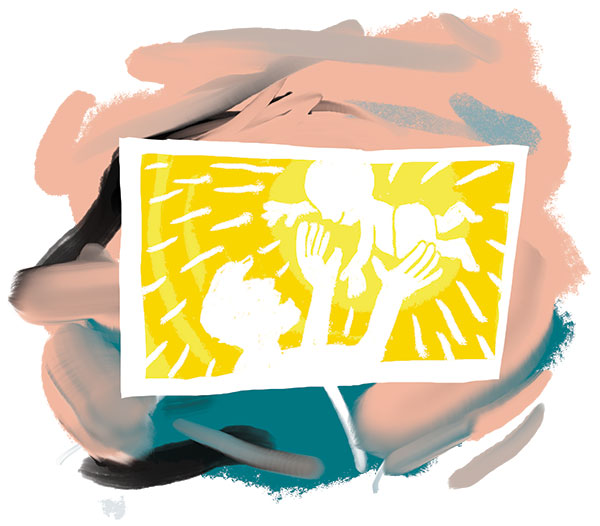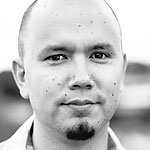
My son died of cancer. Sorry to ambush you, but there's no sugarcoating a child's death.
Nobody expects a healthy 1-year-old to die, especially their own. Just before Vincent Wing Seun Stringer's first birthday in May 2010, my wife, Rebecca, felt a lump in Vincent's abdomen. After several weeks of tests and scans, he was diagnosed with an extrarenal rhabdoid tumor, Stage IV liver cancer, from out of nowhere. The first 15 weeks of aggressive chemotherapy helped shrink it, but the tumor grew back, spreading to Vincent's right lung.
Believing God could work a miracle, we took him to receive healing prayers from anyone who wanted to try. We even flew across the country to a church where we had heard reports of supernatural healings. Everyone we knew was praying for Vincent. We attempted everything medically possible, but our son wasn't healed.
Vincent's name means "Victorious", but we buried him five years ago. He was only 18 months old.
In his classic "Lament for a Son", Nicholas Wolterstorff writes, "When we gather now there's always someone missing, his absence as present as our presence, his silence as loud as our speech." In our family, Vincent's absence is always present. I experience this paradox every time someone unknowingly comments on the age difference between our oldest and youngest children. It only takes a few seconds.
"How old are your kids?"
"Eight and 3."
"Good spacing there."
At this point, I must decide what to say about the age gap. Will I mention Vincent or not? Am I ready to introduce the subject of a dead child into this casual conversation — right here, right now, at the playground, in the checkout line, or outside the library? On one hand, I want people to know we had a middle child. On the other hand, I'd rather not launch into the whole story of who Vincent was, when he died, and how it happened.
If I want to keep the conversation light, I might say, "Yup, they keep us busy, that's for sure." Or if I'm ready to introduce Vincent, I might say, "Actually, we had a middle son who died of cancer five years ago."
And they might answer, "Oh … what? I'm so sorry."
"Thanks. You were right to notice the age gap, because there would be less space between Theo and Andre if Vincent were still alive."
"Oh, gosh, that's horrible."
Then comes the awkward silence. I start kicking myself for not keeping it light. Since neither of us has much to say on this topic, it's just a matter of who will change the subject first. But how do you do that without putting a tidy little bow on a big messy loss.
It's no wonder we avoid serious conversations about death. Nobody wants to say the wrong thing, especially when a simple comment can transport us to painful places.
This is why we opt for talking about food, entertainment, and people who aren't dead yet. Death prompts the conversations we don't want to have. It raises the questions we don't want to have answered.
Imagine if your child died of cancer. How often would you talk about your loss? How would you explain death to their siblings? How would you incorporate their absence into your family's annual rhythm with each passing year? How long would your period of mourning last?
Grief is an isolating journey, but it can also form a community. I've found that one of the most helpful ways to manage grief involves gathering with fellow grievers. Shortly after Vincent was diagnosed, Rebecca and I joined a support group for parents experiencing childhood cancer. Every month, we shared our stories, cried together, and reminded each other we weren't alone. The group included families battling cancer as well as those whose kids hadn't made it. We started off in the first category, but eventually joined the second.
In this group, we met people who understood our loss. They didn't remove our pain, but instead showed us theirs. They didn't offer advice or easy answers, but gave us something far better: glimpses of hope and courage. Many of these new companions came from different cultures and religious backgrounds, but our common experience with childhood cancer forged us into loyal allies.
The group also taught me about the fine line between sharing stories and comparing them. Typically, we think of sharing as "good" and comparing as "bad", but I believe it's more complicated than that. For example, why is it comforting to hear other people's stories of heartbreak? Why does listening to a fellow parent's journey through child loss somehow help me face my own? Isn't it because on some level, we aren't just sharing, but comparing?
One of my favorite grief poems is by Emily Dickinson:
I measure every Grief I meet With narrow, probing, Eyes —I wonder if It weighs like Mine —Or has an Easier size.
Like Dickinson, I often weigh my grief in comparison with those I meet. Sometimes my situation seems worse, but I'm continually surprised by how many families have lost far more. The way Vincent died was horrible, but it could have been worse.
For instance, we had the benefit of some warning before he died. We had a terrific health care coverage and a capable team of pediatric oncology specialists who tried everything possible to stop the cancer. We belonged to a loving church and a caring support group who made the experience slightly less agonizing. We felt the prayers of friends around the world. We had people who weren't afraid to cry with us.

Unlike many whose children die, we were able to share Vincent's final days together as a family at home. We weren't ready to say goodbye, but I'm thankful we had the opportunity. Not everyone is surrounded by love at a standing-room-only memorial service, but we were. Try as we might to avoid comparing losses, it's an inevitable part of the grieving process. Just ask anyone who's ever said "I miss you" to someone who can't reply.
I've often been asked how my faith survived Vincent's death. The short answer is lament.
The laments we read in Scripture vividly express raw frustration — “Why do you ignore our suffering and oppression?” (Psalm 44:24 NLT); sorrow — "Every night I flood my bed with tears” (Ps. 6:6 NRSV); abandonment — "My God, my God, why have you forsaken me?” (Ps. 22:1 NRSV); anger — "you God of vengeance, shine forth!” (Ps. 94:1 NRSV); anguish — "my heart is pierced within me” (Ps. 109:22 NRSV); questioning — "How long, O Lord? Will you forget me forever?” (Ps. 13:1 NRSV); accusation — "Have you not rejected us, O God?" (Ps. 108:11 NRSV); and yes, even comparisons — "Why do the wicked prosper?” (Job 21:7 NLT). So many different emotions, but all directed straight at God.
The Bible seems to expect our laments. What further permission do we need?
Lament is the place I went after Vincent's healing didn't happen. Lament is how I live with the gap between my kids' ages. Lament is the tradition informing Wolterstorff and Dickinson. Lament is the practice that brings grief groups together. Lament is what gives me strength when I share and gratitude when I compare. Lament is permission to ask God any question. Lament is the reminder that I'm not alone.
Really, God, how could You?
What kind of God lets cancer kill children?
Didn't You hear our prayers?
Didn't You want Vincent to live?
Why did You give him to us in the first place?
I feel cheated, devastated, furious.
And what are we supposed to do now? Just bury him and move on?
I won't get over this one, God.
I cannot drink this cup — like I have a choice.
The permanence is overwhelming.
We weren't ready to say goodbye.
No words can fix this.
My son is gone. And You are silent.
But who else can handle my anger but You, Lord?
Who else hears this prayer?
Where else can I turn?
What kind of God gives up His beloved son?
Help me, O Lord, to make it through this day.
Save me, O Lord, from sugarcoated answers.
Comfort me, O Lord, when all I know is loss.

Dan Stringer is a fourth-generation hapa Chinese American from Honolulu, HI. He will finish a Master of Divinity from Fuller Theological Seminary in June with an emphasis in Asian American contexts. Find him Tweeting @StringerDan and blogging (if that’s still a thing) at danstringer.net.
